UNCC100 Assessment Task 1: Catholic Social Thought Principles
VerifiedAdded on 2023/04/20
|6
|1735
|106
Essay
AI Summary
This essay delves into the principles of Catholic Social Thought (CST), providing definitions and descriptions of five key tenets: Dignity of the Human Person, Common Good, Subsidiarity, Preferential Option for the Poor, and Stewardship of Creation. The paper emphasizes the importance of respecting human life, promoting community well-being, maintaining individual liberty, supporting the vulnerable, and caring for the environment. Furthermore, it connects these principles to the concept of 'self' and community, arguing that individual actions contribute to the common good and that stewardship is essential at both personal and societal levels. The student's commentary underscores the relevance of CST in fostering a just and equitable society, drawing on the belief that individual responsibility is key to the well-being of the community and the environment. The essay also discusses the historical context of CST, referencing Pope Leo XIII's foundational work, *Rerum Novarum*, which laid the groundwork for the principles discussed.
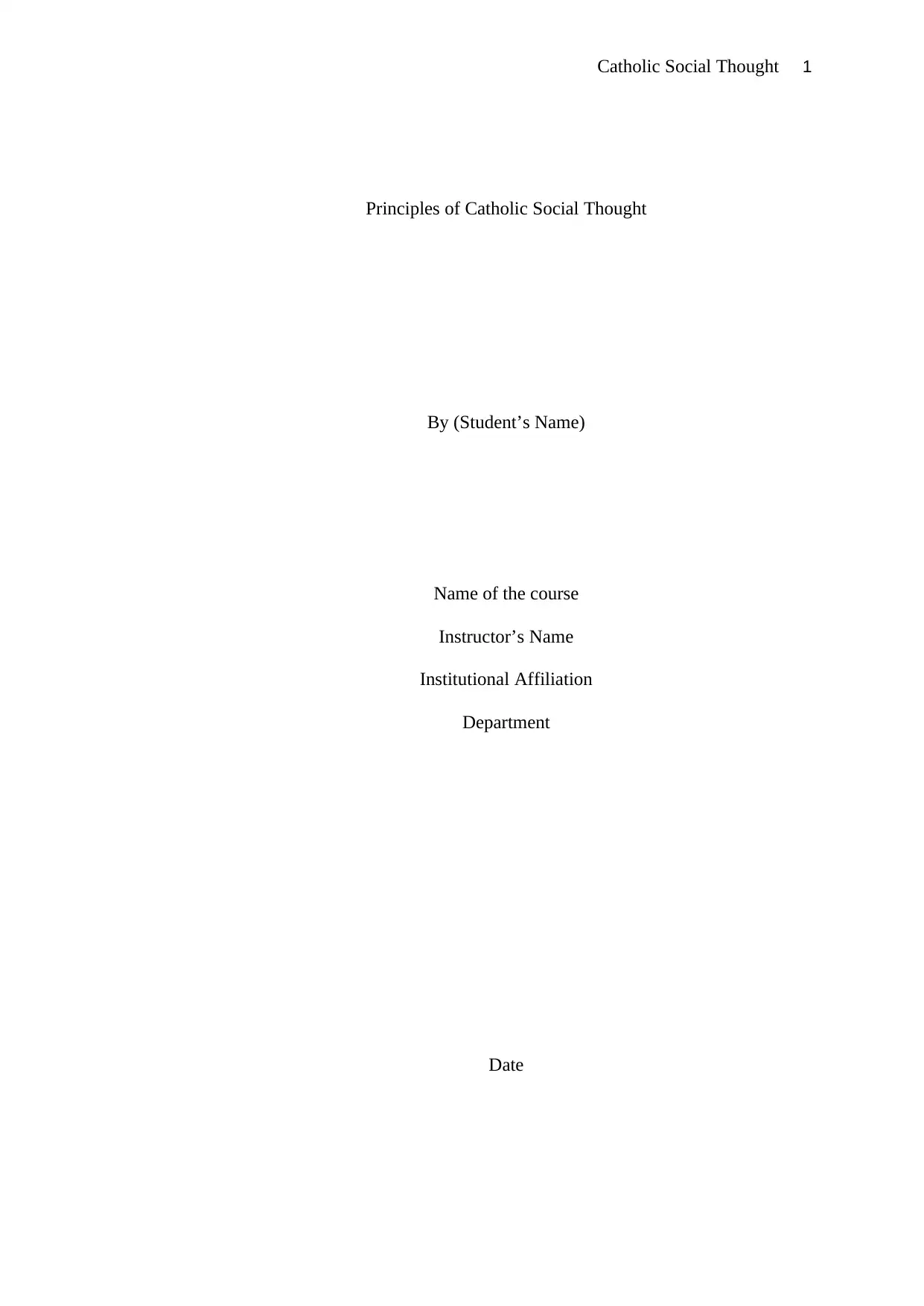
Catholic Social Thought 1
Principles of Catholic Social Thought
By (Student’s Name)
Name of the course
Instructor’s Name
Institutional Affiliation
Department
Date
Principles of Catholic Social Thought
By (Student’s Name)
Name of the course
Instructor’s Name
Institutional Affiliation
Department
Date
Paraphrase This Document
Need a fresh take? Get an instant paraphrase of this document with our AI Paraphraser
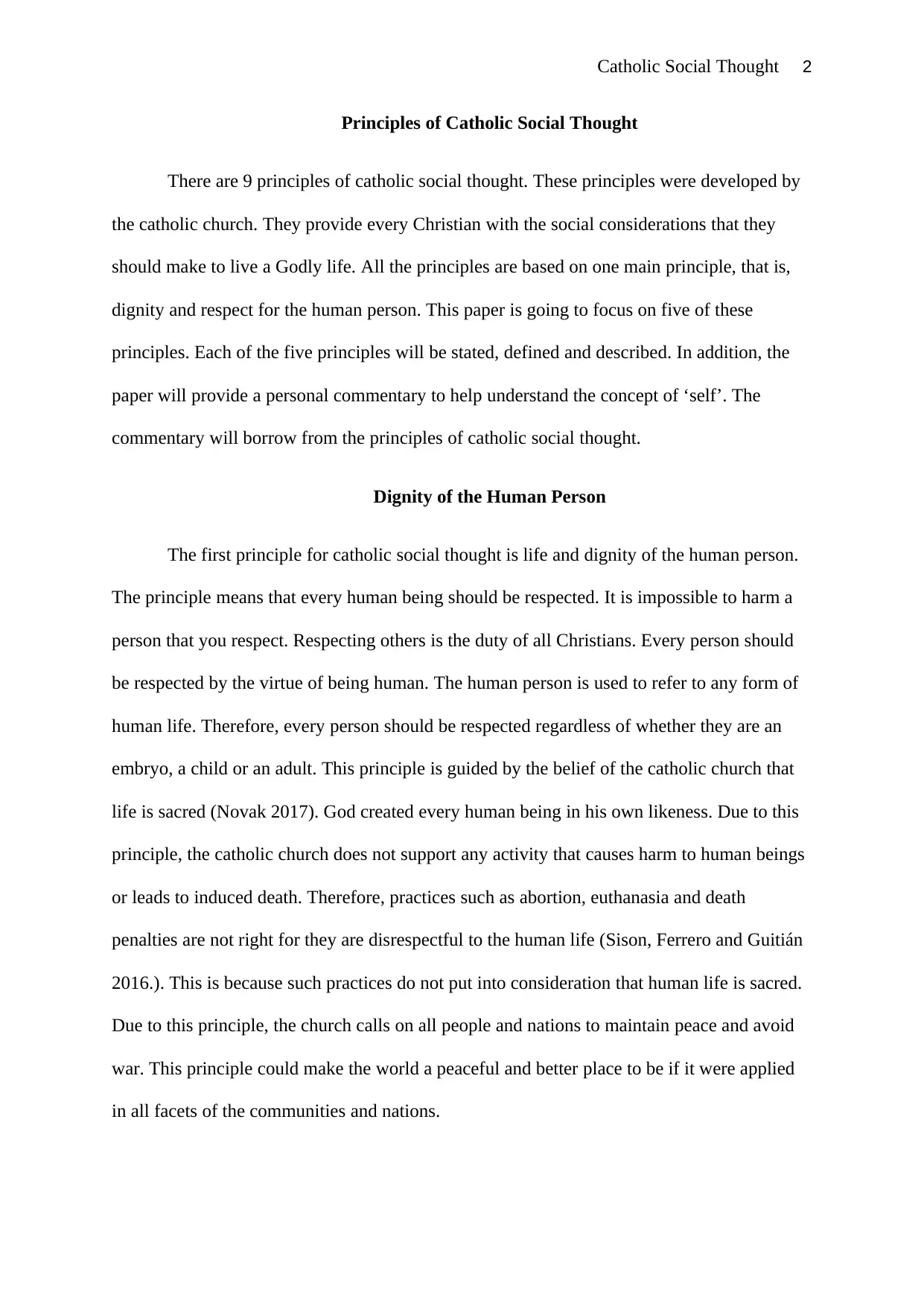
Catholic Social Thought 2
Principles of Catholic Social Thought
There are 9 principles of catholic social thought. These principles were developed by
the catholic church. They provide every Christian with the social considerations that they
should make to live a Godly life. All the principles are based on one main principle, that is,
dignity and respect for the human person. This paper is going to focus on five of these
principles. Each of the five principles will be stated, defined and described. In addition, the
paper will provide a personal commentary to help understand the concept of ‘self’. The
commentary will borrow from the principles of catholic social thought.
Dignity of the Human Person
The first principle for catholic social thought is life and dignity of the human person.
The principle means that every human being should be respected. It is impossible to harm a
person that you respect. Respecting others is the duty of all Christians. Every person should
be respected by the virtue of being human. The human person is used to refer to any form of
human life. Therefore, every person should be respected regardless of whether they are an
embryo, a child or an adult. This principle is guided by the belief of the catholic church that
life is sacred (Novak 2017). God created every human being in his own likeness. Due to this
principle, the catholic church does not support any activity that causes harm to human beings
or leads to induced death. Therefore, practices such as abortion, euthanasia and death
penalties are not right for they are disrespectful to the human life (Sison, Ferrero and Guitián
2016.). This is because such practices do not put into consideration that human life is sacred.
Due to this principle, the church calls on all people and nations to maintain peace and avoid
war. This principle could make the world a peaceful and better place to be if it were applied
in all facets of the communities and nations.
Principles of Catholic Social Thought
There are 9 principles of catholic social thought. These principles were developed by
the catholic church. They provide every Christian with the social considerations that they
should make to live a Godly life. All the principles are based on one main principle, that is,
dignity and respect for the human person. This paper is going to focus on five of these
principles. Each of the five principles will be stated, defined and described. In addition, the
paper will provide a personal commentary to help understand the concept of ‘self’. The
commentary will borrow from the principles of catholic social thought.
Dignity of the Human Person
The first principle for catholic social thought is life and dignity of the human person.
The principle means that every human being should be respected. It is impossible to harm a
person that you respect. Respecting others is the duty of all Christians. Every person should
be respected by the virtue of being human. The human person is used to refer to any form of
human life. Therefore, every person should be respected regardless of whether they are an
embryo, a child or an adult. This principle is guided by the belief of the catholic church that
life is sacred (Novak 2017). God created every human being in his own likeness. Due to this
principle, the catholic church does not support any activity that causes harm to human beings
or leads to induced death. Therefore, practices such as abortion, euthanasia and death
penalties are not right for they are disrespectful to the human life (Sison, Ferrero and Guitián
2016.). This is because such practices do not put into consideration that human life is sacred.
Due to this principle, the church calls on all people and nations to maintain peace and avoid
war. This principle could make the world a peaceful and better place to be if it were applied
in all facets of the communities and nations.
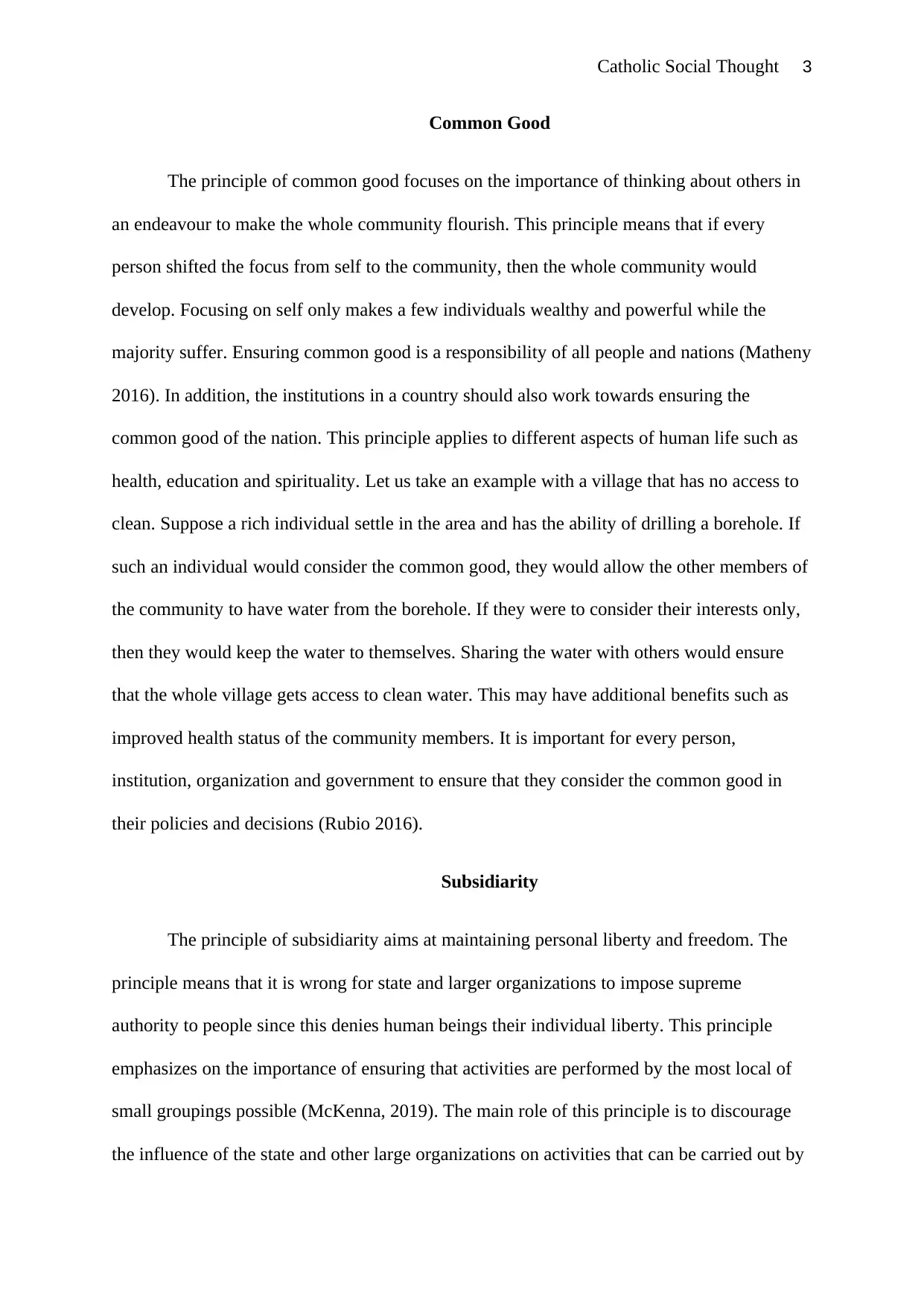
Catholic Social Thought 3
Common Good
The principle of common good focuses on the importance of thinking about others in
an endeavour to make the whole community flourish. This principle means that if every
person shifted the focus from self to the community, then the whole community would
develop. Focusing on self only makes a few individuals wealthy and powerful while the
majority suffer. Ensuring common good is a responsibility of all people and nations (Matheny
2016). In addition, the institutions in a country should also work towards ensuring the
common good of the nation. This principle applies to different aspects of human life such as
health, education and spirituality. Let us take an example with a village that has no access to
clean. Suppose a rich individual settle in the area and has the ability of drilling a borehole. If
such an individual would consider the common good, they would allow the other members of
the community to have water from the borehole. If they were to consider their interests only,
then they would keep the water to themselves. Sharing the water with others would ensure
that the whole village gets access to clean water. This may have additional benefits such as
improved health status of the community members. It is important for every person,
institution, organization and government to ensure that they consider the common good in
their policies and decisions (Rubio 2016).
Subsidiarity
The principle of subsidiarity aims at maintaining personal liberty and freedom. The
principle means that it is wrong for state and larger organizations to impose supreme
authority to people since this denies human beings their individual liberty. This principle
emphasizes on the importance of ensuring that activities are performed by the most local of
small groupings possible (McKenna, 2019). The main role of this principle is to discourage
the influence of the state and other large organizations on activities that can be carried out by
Common Good
The principle of common good focuses on the importance of thinking about others in
an endeavour to make the whole community flourish. This principle means that if every
person shifted the focus from self to the community, then the whole community would
develop. Focusing on self only makes a few individuals wealthy and powerful while the
majority suffer. Ensuring common good is a responsibility of all people and nations (Matheny
2016). In addition, the institutions in a country should also work towards ensuring the
common good of the nation. This principle applies to different aspects of human life such as
health, education and spirituality. Let us take an example with a village that has no access to
clean. Suppose a rich individual settle in the area and has the ability of drilling a borehole. If
such an individual would consider the common good, they would allow the other members of
the community to have water from the borehole. If they were to consider their interests only,
then they would keep the water to themselves. Sharing the water with others would ensure
that the whole village gets access to clean water. This may have additional benefits such as
improved health status of the community members. It is important for every person,
institution, organization and government to ensure that they consider the common good in
their policies and decisions (Rubio 2016).
Subsidiarity
The principle of subsidiarity aims at maintaining personal liberty and freedom. The
principle means that it is wrong for state and larger organizations to impose supreme
authority to people since this denies human beings their individual liberty. This principle
emphasizes on the importance of ensuring that activities are performed by the most local of
small groupings possible (McKenna, 2019). The main role of this principle is to discourage
the influence of the state and other large organizations on activities that can be carried out by
⊘ This is a preview!⊘
Do you want full access?
Subscribe today to unlock all pages.

Trusted by 1+ million students worldwide
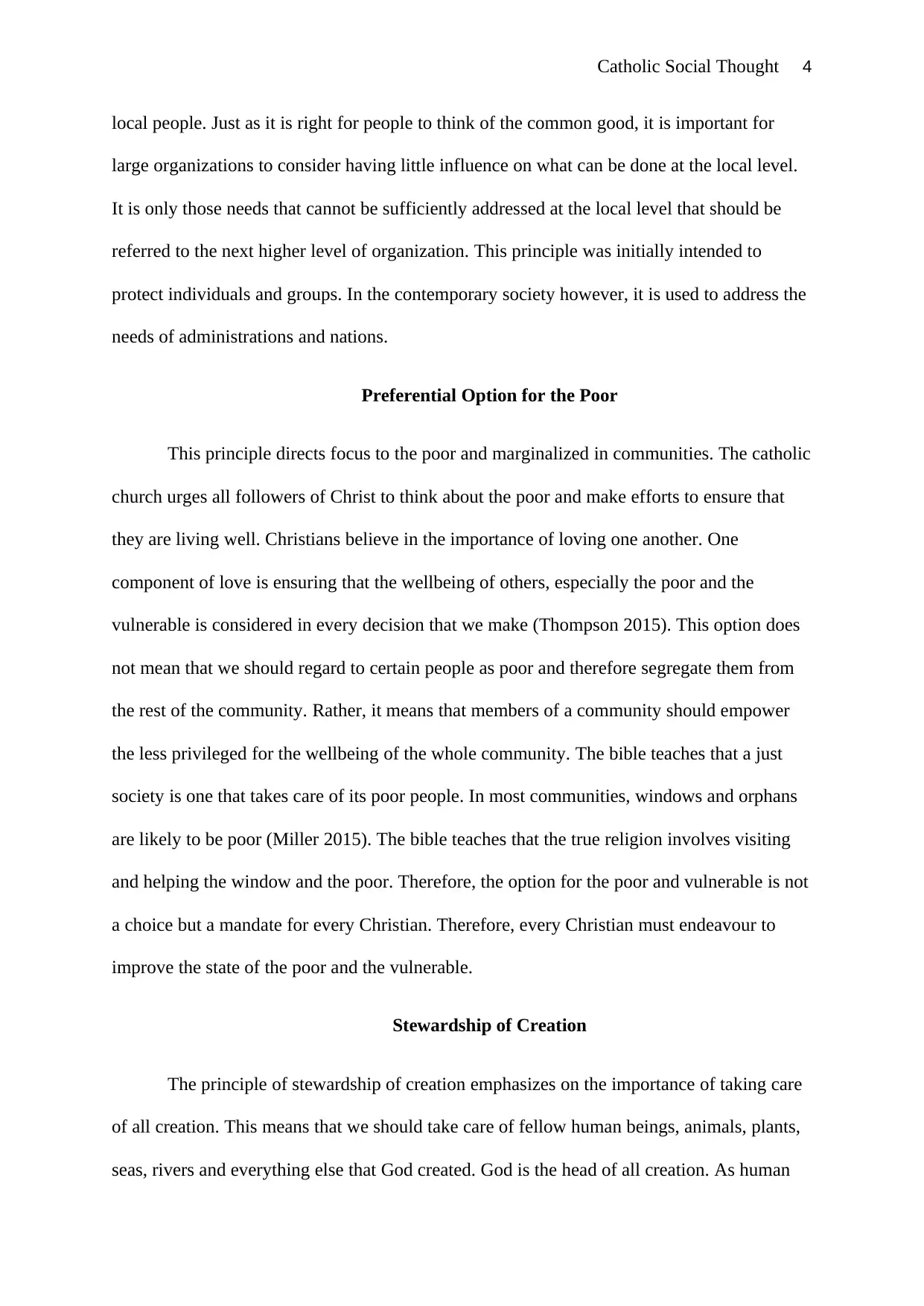
Catholic Social Thought 4
local people. Just as it is right for people to think of the common good, it is important for
large organizations to consider having little influence on what can be done at the local level.
It is only those needs that cannot be sufficiently addressed at the local level that should be
referred to the next higher level of organization. This principle was initially intended to
protect individuals and groups. In the contemporary society however, it is used to address the
needs of administrations and nations.
Preferential Option for the Poor
This principle directs focus to the poor and marginalized in communities. The catholic
church urges all followers of Christ to think about the poor and make efforts to ensure that
they are living well. Christians believe in the importance of loving one another. One
component of love is ensuring that the wellbeing of others, especially the poor and the
vulnerable is considered in every decision that we make (Thompson 2015). This option does
not mean that we should regard to certain people as poor and therefore segregate them from
the rest of the community. Rather, it means that members of a community should empower
the less privileged for the wellbeing of the whole community. The bible teaches that a just
society is one that takes care of its poor people. In most communities, windows and orphans
are likely to be poor (Miller 2015). The bible teaches that the true religion involves visiting
and helping the window and the poor. Therefore, the option for the poor and vulnerable is not
a choice but a mandate for every Christian. Therefore, every Christian must endeavour to
improve the state of the poor and the vulnerable.
Stewardship of Creation
The principle of stewardship of creation emphasizes on the importance of taking care
of all creation. This means that we should take care of fellow human beings, animals, plants,
seas, rivers and everything else that God created. God is the head of all creation. As human
local people. Just as it is right for people to think of the common good, it is important for
large organizations to consider having little influence on what can be done at the local level.
It is only those needs that cannot be sufficiently addressed at the local level that should be
referred to the next higher level of organization. This principle was initially intended to
protect individuals and groups. In the contemporary society however, it is used to address the
needs of administrations and nations.
Preferential Option for the Poor
This principle directs focus to the poor and marginalized in communities. The catholic
church urges all followers of Christ to think about the poor and make efforts to ensure that
they are living well. Christians believe in the importance of loving one another. One
component of love is ensuring that the wellbeing of others, especially the poor and the
vulnerable is considered in every decision that we make (Thompson 2015). This option does
not mean that we should regard to certain people as poor and therefore segregate them from
the rest of the community. Rather, it means that members of a community should empower
the less privileged for the wellbeing of the whole community. The bible teaches that a just
society is one that takes care of its poor people. In most communities, windows and orphans
are likely to be poor (Miller 2015). The bible teaches that the true religion involves visiting
and helping the window and the poor. Therefore, the option for the poor and vulnerable is not
a choice but a mandate for every Christian. Therefore, every Christian must endeavour to
improve the state of the poor and the vulnerable.
Stewardship of Creation
The principle of stewardship of creation emphasizes on the importance of taking care
of all creation. This means that we should take care of fellow human beings, animals, plants,
seas, rivers and everything else that God created. God is the head of all creation. As human
Paraphrase This Document
Need a fresh take? Get an instant paraphrase of this document with our AI Paraphraser
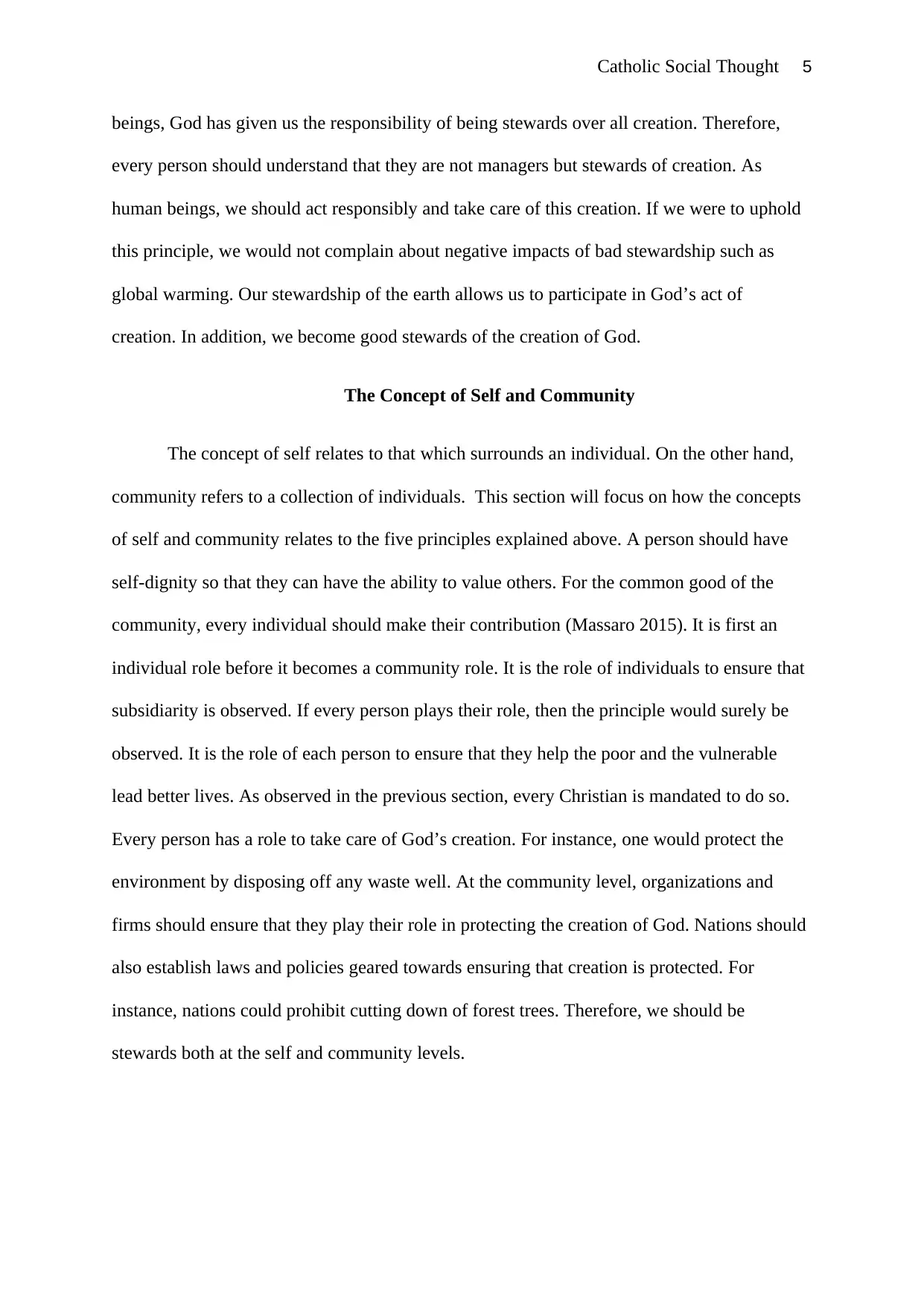
Catholic Social Thought 5
beings, God has given us the responsibility of being stewards over all creation. Therefore,
every person should understand that they are not managers but stewards of creation. As
human beings, we should act responsibly and take care of this creation. If we were to uphold
this principle, we would not complain about negative impacts of bad stewardship such as
global warming. Our stewardship of the earth allows us to participate in God’s act of
creation. In addition, we become good stewards of the creation of God.
The Concept of Self and Community
The concept of self relates to that which surrounds an individual. On the other hand,
community refers to a collection of individuals. This section will focus on how the concepts
of self and community relates to the five principles explained above. A person should have
self-dignity so that they can have the ability to value others. For the common good of the
community, every individual should make their contribution (Massaro 2015). It is first an
individual role before it becomes a community role. It is the role of individuals to ensure that
subsidiarity is observed. If every person plays their role, then the principle would surely be
observed. It is the role of each person to ensure that they help the poor and the vulnerable
lead better lives. As observed in the previous section, every Christian is mandated to do so.
Every person has a role to take care of God’s creation. For instance, one would protect the
environment by disposing off any waste well. At the community level, organizations and
firms should ensure that they play their role in protecting the creation of God. Nations should
also establish laws and policies geared towards ensuring that creation is protected. For
instance, nations could prohibit cutting down of forest trees. Therefore, we should be
stewards both at the self and community levels.
beings, God has given us the responsibility of being stewards over all creation. Therefore,
every person should understand that they are not managers but stewards of creation. As
human beings, we should act responsibly and take care of this creation. If we were to uphold
this principle, we would not complain about negative impacts of bad stewardship such as
global warming. Our stewardship of the earth allows us to participate in God’s act of
creation. In addition, we become good stewards of the creation of God.
The Concept of Self and Community
The concept of self relates to that which surrounds an individual. On the other hand,
community refers to a collection of individuals. This section will focus on how the concepts
of self and community relates to the five principles explained above. A person should have
self-dignity so that they can have the ability to value others. For the common good of the
community, every individual should make their contribution (Massaro 2015). It is first an
individual role before it becomes a community role. It is the role of individuals to ensure that
subsidiarity is observed. If every person plays their role, then the principle would surely be
observed. It is the role of each person to ensure that they help the poor and the vulnerable
lead better lives. As observed in the previous section, every Christian is mandated to do so.
Every person has a role to take care of God’s creation. For instance, one would protect the
environment by disposing off any waste well. At the community level, organizations and
firms should ensure that they play their role in protecting the creation of God. Nations should
also establish laws and policies geared towards ensuring that creation is protected. For
instance, nations could prohibit cutting down of forest trees. Therefore, we should be
stewards both at the self and community levels.
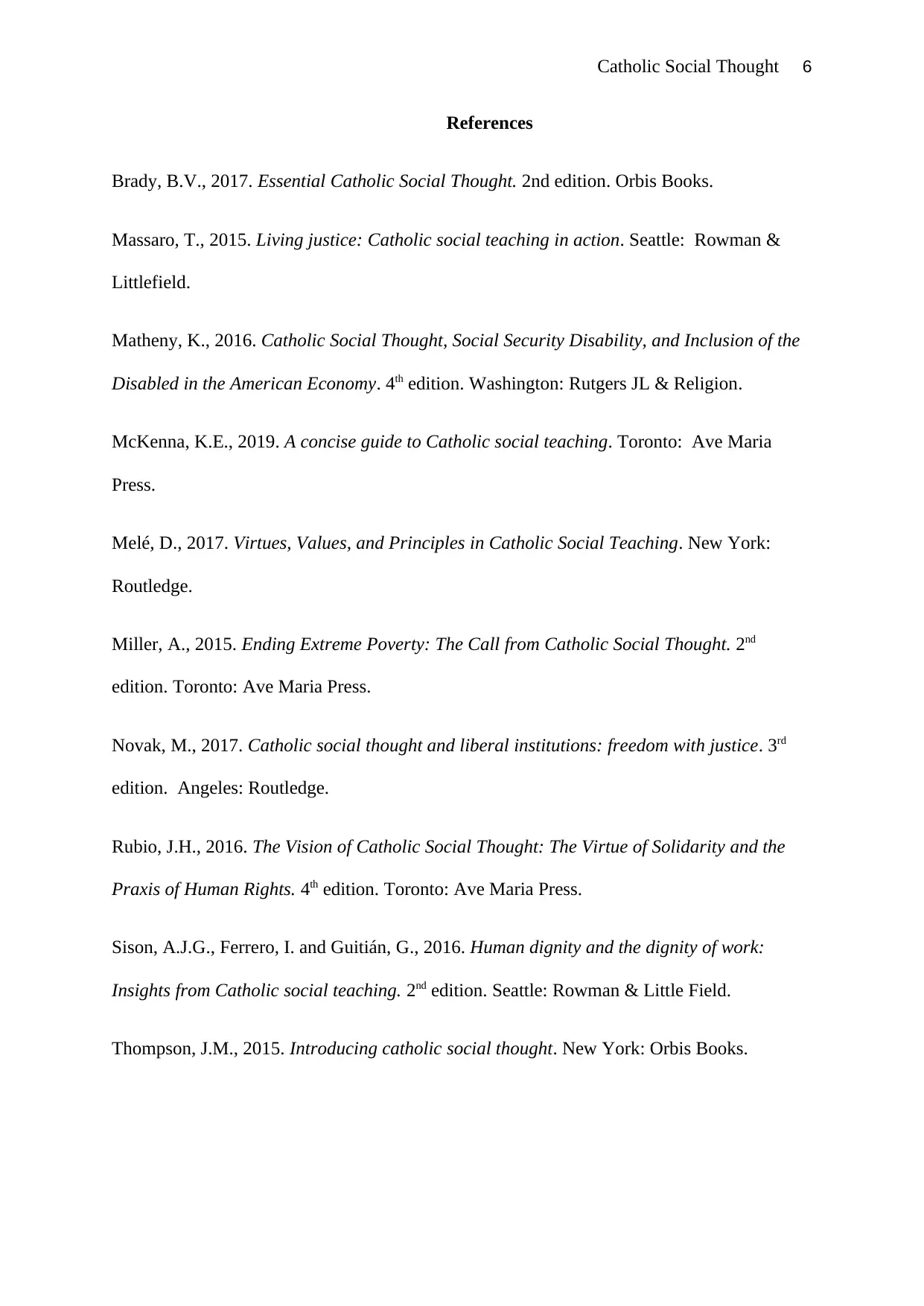
Catholic Social Thought 6
References
Brady, B.V., 2017. Essential Catholic Social Thought. 2nd edition. Orbis Books.
Massaro, T., 2015. Living justice: Catholic social teaching in action. Seattle: Rowman &
Littlefield.
Matheny, K., 2016. Catholic Social Thought, Social Security Disability, and Inclusion of the
Disabled in the American Economy. 4th edition. Washington: Rutgers JL & Religion.
McKenna, K.E., 2019. A concise guide to Catholic social teaching. Toronto: Ave Maria
Press.
Melé, D., 2017. Virtues, Values, and Principles in Catholic Social Teaching. New York:
Routledge.
Miller, A., 2015. Ending Extreme Poverty: The Call from Catholic Social Thought. 2nd
edition. Toronto: Ave Maria Press.
Novak, M., 2017. Catholic social thought and liberal institutions: freedom with justice. 3rd
edition. Angeles: Routledge.
Rubio, J.H., 2016. The Vision of Catholic Social Thought: The Virtue of Solidarity and the
Praxis of Human Rights. 4th edition. Toronto: Ave Maria Press.
Sison, A.J.G., Ferrero, I. and Guitián, G., 2016. Human dignity and the dignity of work:
Insights from Catholic social teaching. 2nd edition. Seattle: Rowman & Little Field.
Thompson, J.M., 2015. Introducing catholic social thought. New York: Orbis Books.
References
Brady, B.V., 2017. Essential Catholic Social Thought. 2nd edition. Orbis Books.
Massaro, T., 2015. Living justice: Catholic social teaching in action. Seattle: Rowman &
Littlefield.
Matheny, K., 2016. Catholic Social Thought, Social Security Disability, and Inclusion of the
Disabled in the American Economy. 4th edition. Washington: Rutgers JL & Religion.
McKenna, K.E., 2019. A concise guide to Catholic social teaching. Toronto: Ave Maria
Press.
Melé, D., 2017. Virtues, Values, and Principles in Catholic Social Teaching. New York:
Routledge.
Miller, A., 2015. Ending Extreme Poverty: The Call from Catholic Social Thought. 2nd
edition. Toronto: Ave Maria Press.
Novak, M., 2017. Catholic social thought and liberal institutions: freedom with justice. 3rd
edition. Angeles: Routledge.
Rubio, J.H., 2016. The Vision of Catholic Social Thought: The Virtue of Solidarity and the
Praxis of Human Rights. 4th edition. Toronto: Ave Maria Press.
Sison, A.J.G., Ferrero, I. and Guitián, G., 2016. Human dignity and the dignity of work:
Insights from Catholic social teaching. 2nd edition. Seattle: Rowman & Little Field.
Thompson, J.M., 2015. Introducing catholic social thought. New York: Orbis Books.
⊘ This is a preview!⊘
Do you want full access?
Subscribe today to unlock all pages.

Trusted by 1+ million students worldwide
1 out of 6
Related Documents
Your All-in-One AI-Powered Toolkit for Academic Success.
+13062052269
info@desklib.com
Available 24*7 on WhatsApp / Email
![[object Object]](/_next/static/media/star-bottom.7253800d.svg)
Unlock your academic potential
Copyright © 2020–2026 A2Z Services. All Rights Reserved. Developed and managed by ZUCOL.




